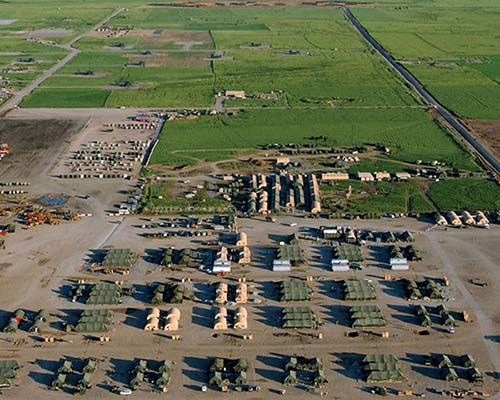DOWNLOAD
The hydraulics of the MC-130 whined in protest as it twisted and turned, climbed and dropped through the dark Iraqi sky. Hours earlier in Romania, the troopers of Bravo Forward Support Company (FSC), 528th Special Operations Support Battalion, had loaded and strapped their equipment to the floor of the aircraft and buckled themselves into the jump seats. The battle for northern Iraq was raging and the Combined Joint Special Operations Task Force -North (CJSOTF-North) needed a command post closer to the fight. For weeks Bravo FSC had been in Romania safe and secure, far from the battle; now it was about to set down in the middle of “Indian” country and build a base for the 10th Special Forces command group. Its destination was an abandoned Iraqi airstrip outside the city of Irbil in northern Iraq.1
During their preflight briefings, the loadmaster informed the Bravo FSC soldiers that the aircraft would be doing a combat off-load. He explained that the area around the airfield was considered hostile and the combat landing was necessary to minimize the aircraft’s time on the ground. Although several of the Bravo FSC soldiers had been in combat in Afghanistan, none had ever done a combat landing in an MC-130. Inside the bucking aircraft jammed with soldiers and equipment, there was not a lot of talking going on; each soldier was lost in thought. Some went through a mental checklist of what they had to do on the ground. Others thought of loved ones back home and remembered more pleasant times. Still others nervously checked their weapons and ammo one last time—again. And some, the more fortunate ones, drifted off to sleep.
When the loadmaster gave the twenty minutes warning, the interior lights were switched from white to red to help the soldiers’ eyes to adjust to the dark. Wherever their minds had been before, everyone was focused now. There was a flurry of activity as the troopers checked the quick release on the ramp pallet and geared up. To minimize exposure to enemy ground fire, the aircraft would not come to a complete stop, but would continue rolling while the pallet slid off the ramp, followed by the soldiers. The loadmaster gave the one minute warning. The soft red light revealed that beneath the camouflage face paint, everyone was ready. The aircraft banked sharply, the hydraulics screamed and the landing gear thumped as it locked in place. Then, for what seemed hours although it was only a few seconds, the plane seemed suspended in the air while the wheels searched and reached in the dark for the ground. Every trooper silently breathed a sigh of relief as the wheels made contact. Getting there was sometimes more than half the battle.
The MC-130 taxied quickly to the end of the flight strip and made a 180-degree turn. As it turned, the loadmaster opened the tailgate and lowered the ramp. The cavernous hole where the ramp had been reminded the troopers of a “black hole” in space. The equipment pallet was released and was sucked into the black hole. With the plane still moving, the loadmaster turned to the section leader and yelled, “Go, go, go!” The Bravo troopers hurriedly followed the pallet into the darkness and took up security positions on the edge of the runway. Even as the last soldier was leaving the aircraft, the loadmaster was raising the ramp and the pilot was gunning the engines for takeoff. In mere seconds, the MC-130 was airborne and receded into the darkness.2
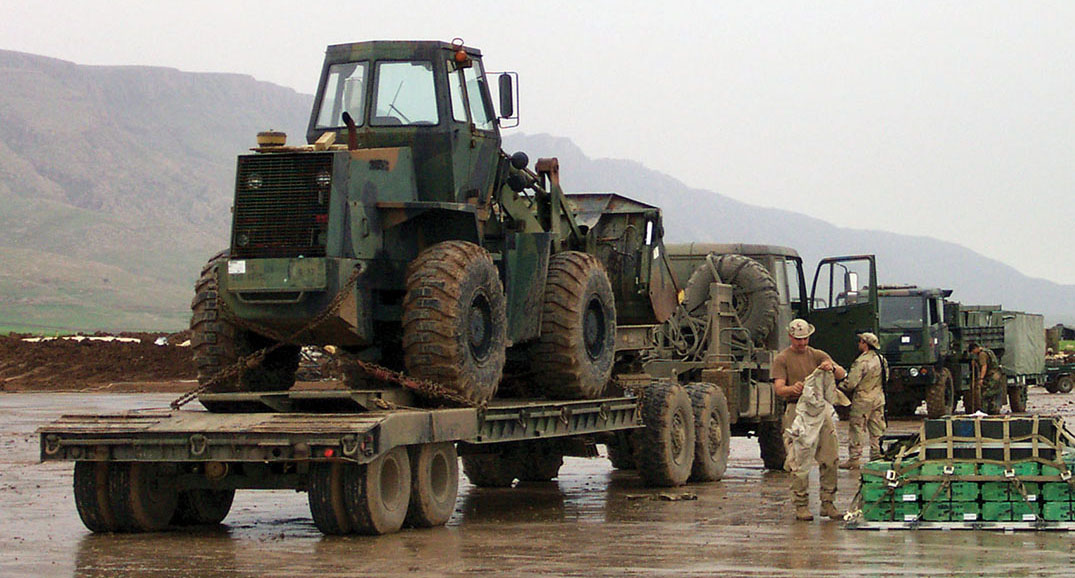
For Major (MAJ) Ronald Green’s Bravo FSC, preparation began months earlier when it was given the mission to provide direct combat service support to the 10th Special Forces Group (SFG) and CJSOTF-North. In early February, MAJ Green dispatched a Movement Control Team (MCT) to Fort Carson, Colorado, to assist the 10th Special Forces Group with its air movement to an intermediate staging base (ISB) in Germany.3 In the past, the 10th SFG had deployed a relatively small number of people and depended upon the installation movement control team for assistance. The deployment of the entire 10th Special Forces Group plus other units at Fort Carson exceeded the installation’s capabilities to assist. First Lieutenant (1LT) Marty Calkins, a veteran of operations in Afghanistan, headed up the MCT sent to help the 10th SFG deploy.4
The three-man team from Bravo FSC brought with them subject matter expertise and practical experience working with Air Force load teams. 1LT Calkins worked with each company to prepare load plans, weigh the vehicles and pallets, calculate centers of gravity, perform safety inspections, and provide certifications for hazardous material.5 Once the airflow was underway, MAJ Green dispatched another team to Germany to assist with the reception of the unit personnel and equipment. Stuttgart, Germany, was only intended to be a temporary ISB until the political issues with Turkey were settled. Then everything would flow into the planned intermediate staging base at Dyarkibir Air Force Base, Turkey. As it turned out, the issue was not favorably resolved in time, and almost the entire force ended up deploying into Stuttgart.6
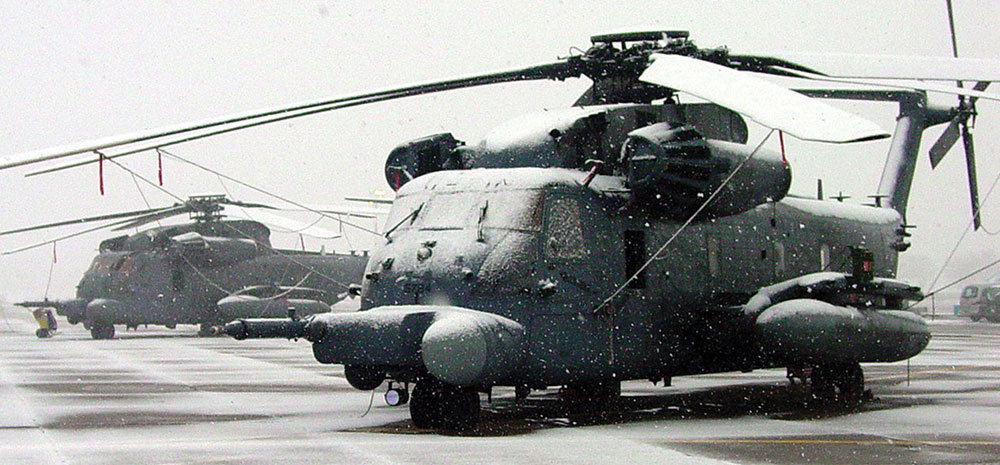
As troops and equipment began to build up in Germany, the CJSOTF-North staff developed alternatives to the planned ISB in Turkey. A number of possibilities were examined, but in the end, Colonel Charlie Cleveland, 10th SFG commander, opted to move the ISB to Constanta, Romania, to get as close as possible to the operational area. Constanta is a popular Romanian summer resort town on the Black Sea with Mihial Airbase nearby. This airbase could not only accommodate the large C-5, C-141, and C-17 Air Force transports, but also had enough ramp space to park a number of them on the ground for unloading, loading, and overnight stops. Constanta was approximately ten miles away and, because it was the winter off-season, there were a number of hotels available for contract billeting. Everything else that was needed for base operations could also be contracted locally. At the time, it also seemed likely that even if Turkey did not allow basing or ground transit of U.S. forces, surely they would allow overflight.7 That assumption initially proved to be false.
Constanta may be a resort area during the summer, but in late February and early March 2003 it was a cold, bleak, and windy place. The first troops on the ground lived and worked on the windswept airfield in unheated tents. Once the contracts were in place, living and working conditions improved dramatically. The troops were, for the most part, supplied, fueled, transported, billeted, and fed by contracted sources coordinated and supervised by Bravo FSC. While CJSOTF-North remained in Constanta, all tactical operations were coordinated and planned from Mihial Air Base. Bravo FSC helped set up the CJSOTF-North Operations Center at the airfield and established the power to run the myriad of lights, computers, and other electronic devices in the headquarters. The company’s mechanics worked long and hard to make sure that all the deploying vehicles were modified to carry the increased amounts of equipment, fuel, and weapons needed to operate independently in northern Iraq. In addition to helping run power to all the CJSOTF-North tents, Specialist Chad Olsen, a power generation expert from Elyria, Ohio, helped prepare equipment pallets, set up heaters, and pitch tents. In Bravo FSC it was typical for soldiers to pitch in as needed, regardless of MOS (Military Occupational Skill). Olsen noted, “I even helped some Croatian contract technicians set up the Titan system (RF visibility tagging system) used to track our pallets and containers of equipment.”8
The dispute with Turkey had a major impact on 10th SFG’s infiltration plan. When the planned ground assault through Turkey had to be scrapped, U.S. Central Command planners looked to 10th SFG and the 173rd Airborne Brigade as a way to put as many U.S. troops on the ground in northern Iraq as quickly as possible. 10th SFG had already changed its planning to incorporate the seemingly inevitable air infiltration, but the decision to send in the 173rd caused a shift in airlift priority, especially for the C-17s that had originally been tasked with transporting 10th SFG’s support package. With the C-17s diverted in anticipation of the 173rd’s infiltration, 10th SFG was forced to reconfigure its loads for transport by MC-130s.9
As the infiltration phase of the operation began, nearly everyone available in Bravo FSC helped prepare the Special Forces teams’ vehicles and equipment. The company’s four-man MCT formed the nucleus of a larger team to support the entire CJSOTF-North. The rest of the team was formed by drafting unit truck drivers, mechanics, and anyone else who was available. The MCT loaded and unloaded aircraft, certified loads, prepared load plans, and adjusted to the airflow.10 Staff Sergeant (SSG) Michael Daigle, a New Orleans native and ammunition section leader, remembered that the airflow and the type of aircraft were constantly changing: “We would build a pallet for a C-17, and two hours later we would be told we were getting a C-130 and we’d have to tear down the pallet and rebuild it [to fit the new aircraft]. You didn’t know what bird you were leaving on until it showed up.”11
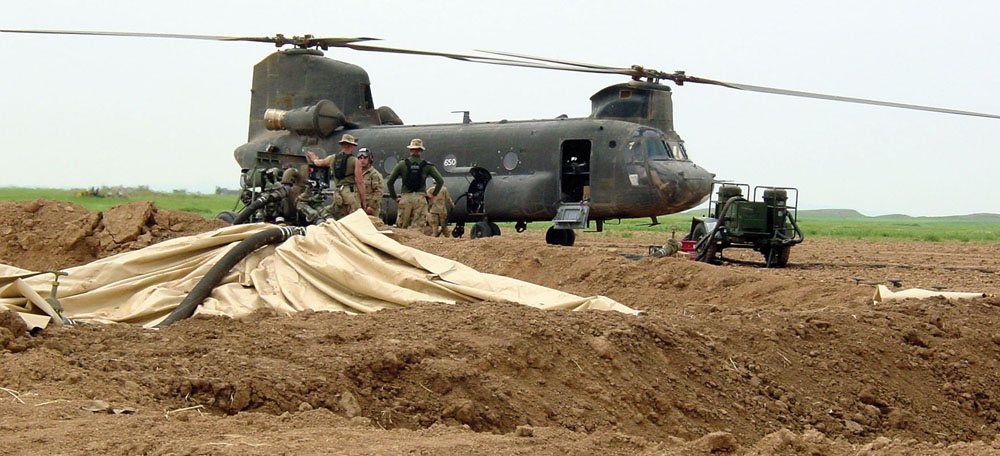
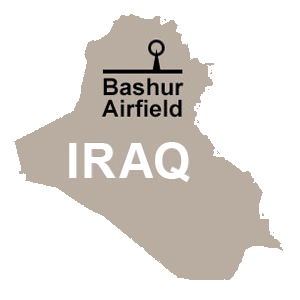
Most of the combat service support elements remained in Romania through the first infiltration, but two notable exceptions were the Fuel System Supply Point (FSSP) teams that infiltrated into northern Iraq near Bashur and As Sulaymaniah. Their missions were to provide forward refueling for Combat Search and Rescue (CSAR) and special operations aircraft. With Kurdish fighters and their assigned Special Forces Teams providing security for the sites, the teams were flown in under cover of darkness.12 On the night of 25 March 2003, the first fuel team, headed by SSG Jose Uribe, infiltrated into Bashur Airfield in support of Forward Operating Base (FOB) 102 and was on hand when the 173rd Airborne jumped on the airfield the next morning.13
Three days later, Sergeant (SGT) Danny Tyler and his team of self-described “Fuel Dawgs” were told to get their equipment together and load it onto an MC-130, because they were going into northern Iraq to support FOB 103. The team of eight fuelers loaded the pumping unit, two collapsible fuel bags, and fifty 20-foot sections of four inch fuel hose on the floor of the aircraft. Because of weight restrictions for the long flight from Romania, the team had to leave its HMMWVs behind; instead, it loaded Gator utility vehicles to move the equipment off the aircraft and position the fuel pods. Tyler’s team strapped its only pallet, loaded with the pumping unit, onto the ramp of the aircraft.14
When the FSSP team arrived at As Sulaymaniah, they found that the mud near the airfield was so deep that it was impossible to set up the fuel bags without some site preparation. The team contracted Kurdish locals to dig pits and line them with gravel to prevent the fuel bags from disappearing in the mud when filled. Once the FSSP was up and running, it was able to service the special operations MH-47s and MH-53s that comprised the majority of its clients. On one memorable occasion, however, the FSSP team serviced an MC-130 that landed at the airfield critically low on fuel. The FSSP received its fuel resupply via MC-130s using the “wet-wing technique”—an incoming plane empties all the fuel from its tanks into the fuel bags, except what it needs to return to the rear area.15
At the end of March, CJSOTF-North deployed forward from Romania to an abandoned Iraqi airfield near Irbil. While the airfield was isolated and austere, it was better situated for command operations. SGT Earl Gupton, a Henderson, North Carolina, native and SGT Chavis Moultry of Troy, Alabama, were among the first Bravo FSC troopers into Irbil. A few short days before they deployed, they were told to get ready to establish a bare-base forward operating base (FOB) but were provided no further details. On the night of 30 March, SGT Gupton’s team loaded aboard an MC-130 for a fully blacked-out infiltration into Irbil. “The first priority that night,” said SGT Gupton, “was to dig a fighting position and hunker down.”16
SGT Moultry’s team flew in the next night along the infamous “Ugly Baby” infiltration route, as described at the beginning of this article. Of the experience, Moultry exclaimed, “It was pretty crazy; the night was pitch black! You couldn’t see nothing!” When morning came, SGT Moultry received perhaps an even bigger surprise; instead of the desert he expected to see, he discovered the airfield was surrounded by lush green vegetation.17
When daylight came, Bravo FSC secured the base camp location and began to work on establishing a forward base for CJSOTF-North. Bravo FSC personnel erected the Operations Center, sleeping tents, mess, medical facilities, and eventually even installed showers.18 In the beginning, the Iraqis fired rockets nightly, but the fire was never very accurate and always brought a quick response from the air cover flying overhead. After about a week, the attacks stopped. SGT Gupton guessed that “the aircraft attacks had either wiped out all the Iraqis, or they finally figured out that shooting rockets at the camp was hazardous to their health.”19
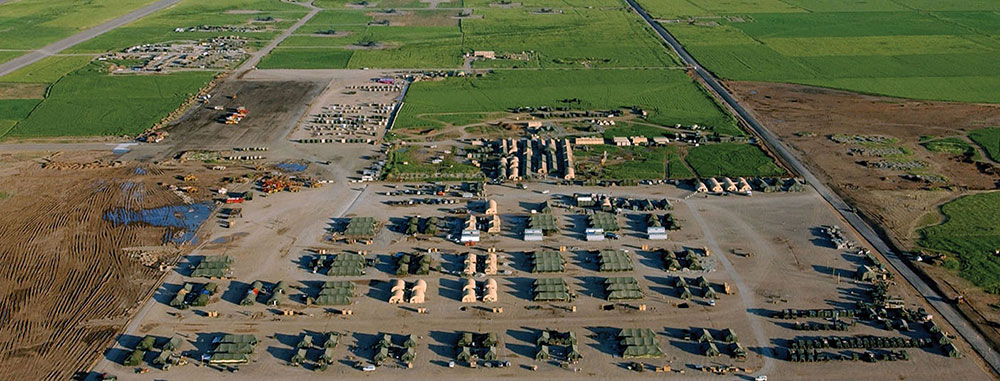
In a matter of days, Bravo FSC had constructed a base for twenty-four hundred personnel. It cleared land, erected tents, drilled wells, and established supply points for all classes of supply. Using Kurdish contractors, Bravo FSC had an ammunition supply point (ASP) built outside the base camp to serve all special operations forces (SOF) in northern Iraq. It was enclosed by a twenty-foot high perimeter berm about a mile in circumference, with six interior berms. The local Kurdish Peshmerga provided an outer ring of security for the Americans. SSG Daigle recalled that “the Kurds were extremely hospitable, friendly people” and brought his team hot tea every morning.20
Possibly the hardest working and most indispensable soldiers of Bravo FSC were the truckers. These drivers and their trucks were critical to the movement of supplies between SOF units at Bashur, Mosul, Kirkuk, and Al Sulaymaniah. The Bravo FSC truck squads moved urgently needed food, water, ammunition, and supplies both day and night over dangerous and hazardous roads. The platoon also provided convoy escort for local contract vehicles, as well as providing its own convoy security. It logged over ten thousand miles without losing a single vehicle or soldier to accident or hostile action.21
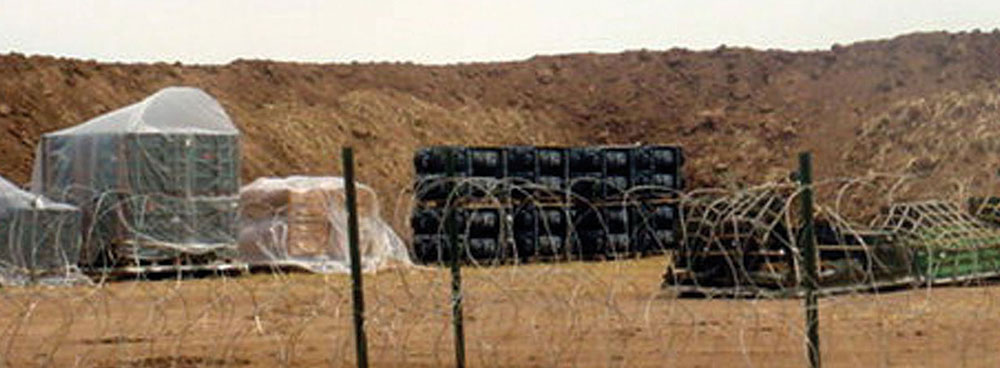
The impact of Bravo Forward Support Company far exceeded the number of soldiers deployed. Small teams worked largely unseen at critical nodes to ensure that the supplies and equipment needed by SOF operators were delivered on time and in the correct quantities. The normal ratio of support troops to combat soldiers is on the order of at least six to one, but Bravo FSC’s ninety deployed soldiers supported approximately three thousand SOF personnel in those first days of the war, a ratio of less than one support soldier to every two combat soldier. When asked how it was able to accomplish so much with so few, Chief Warrant Officer 3 Francis Rush, Direct Support Maintenance Technician, said, “In our shop at Bragg, we have a sign that says ‘We are MOS Gender-Benders,’ which means that we cross train everybody. When you are a small unit you have to pitch in and help wherever you’re needed.”22 It was just such an attitude that enabled the men and women of Bravo FSC, 528th Special Operations Support Battalion, to provide the critical support required in northern Iraq.
